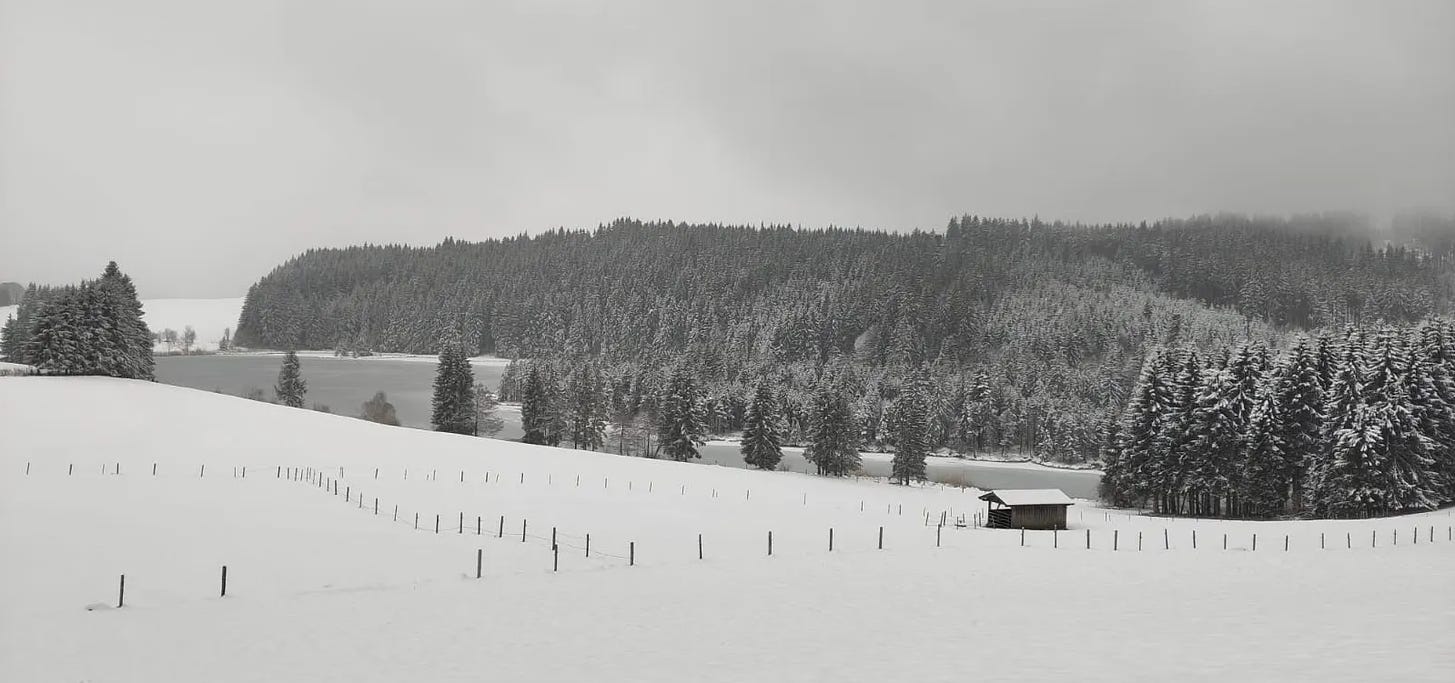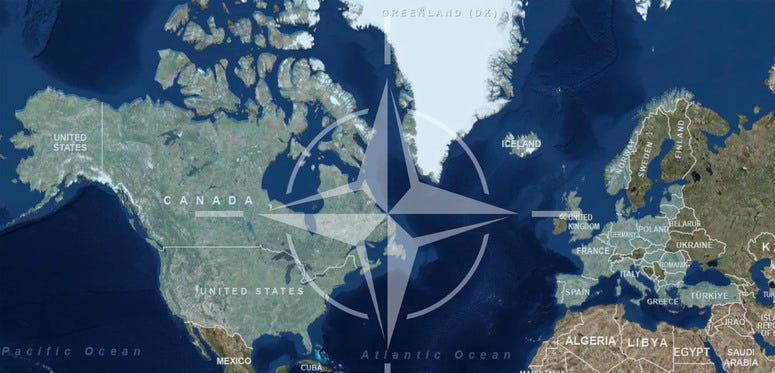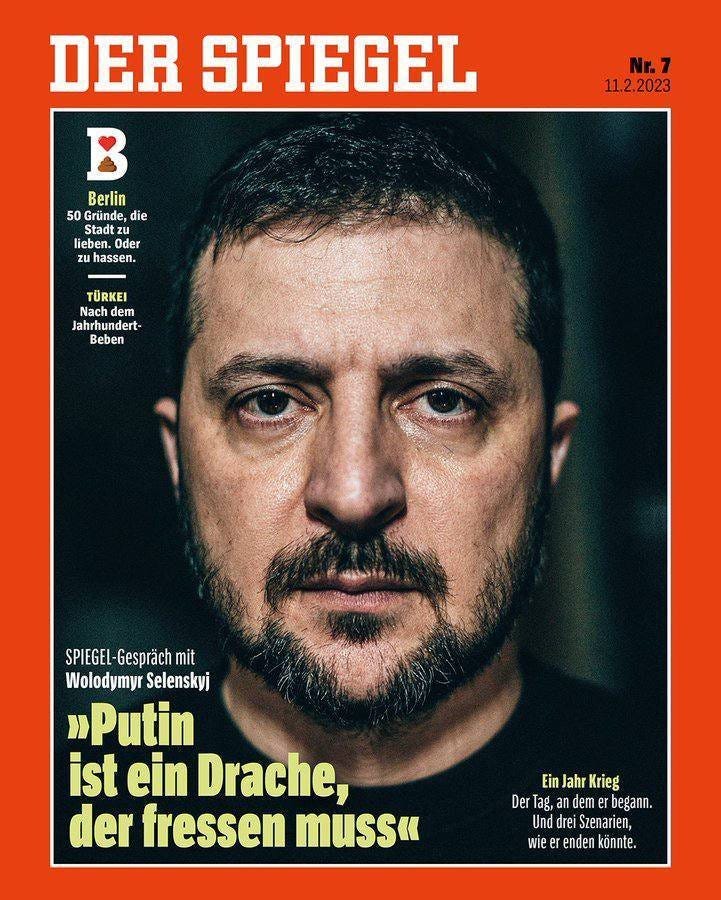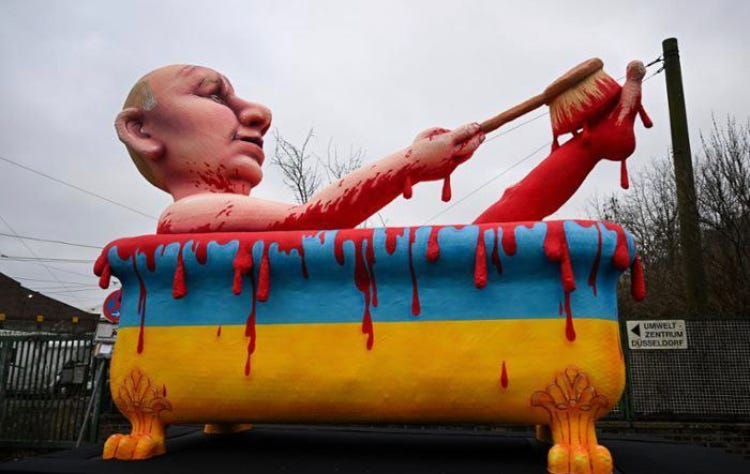Greetings and salutations from continental Europe and a céad míle fáilte romhat to “An Irishman’s Diary - In Times of War and Pestilence”.
Introduction
As a one-time peripatetic Gael now settled in the provincial foothills of the Alps I have created this Substack in order to share reports, observations, and hopefully regular insights from the reputed bronze age heartland of the proto-celtic language. My adopted home finds me within the now German-speaking region oft referred to as D-A-CH (Deutschland, Austria, Confoederatio Helvetica (Swiss Federation)), and my diary will focus an Irish gaze on the current political and cultural goings-on of these central European parts with a dash of historical sauce.
These posts were originally intended for friends and family both back home on the temperate island nestled at the edge of the continental shelf between Britain and the wild Atlantic’s waves, but are also to be enjoyed by any and all whose ways have carried them on the winds to disparate ends of the earth. Think of me as your personal newsman reporting from a small corner of the former Regnum Alamanniae (the Kingdom of Alemannia). Though we have fairly decent internet here, so I will also be able to cover topics further afield.
End of February 2023: War and Pestilence
It is one year now since tanks of the Russian Federation rolled across the border into Ukraine on the eastern periphery of the Europe Union escalating a military conflict which started eight years previously in 2014 following a coup which toppled the elected Ukrainian government. And it is now already three years since the World Health Organisation declared a Public Health Emergency of International Concern on 30 January 2020, before officially characterising the outbreak as a pandemic 6 weeks later. The WHO have yet to downgrade this status, and, if current levels of excess mortality and PCR test-positivity rates are anything to go by, Covid-19 continues to circulate very widely in populations all over Europe. So, I don’t consider the name of this Substack to be all that hyperbolic.
Lighting of Beacon Fires
This weekend sees the custom of Funkenfeuer (literally: sparking or signalling fires) celebrated here in my local region. After the pre-lent excesses of Fasching (local variant of Carnival/Mardi Gras) earlier in the week, the first weekend after Ash Wednesday sees very large bonfires, now often fuelled exclusively by discarded Christmas trees, set alight in rural towns and villages throughout the region at dusk. Such gatherings were once attended by the entire community and are still a popular festive get-together. Communities still often try to out-do one another and more elaborate stacked towers can reputedly reach up to 20m in height and have to be guarded in the run-up so that neighbouring villages could not pre-emptively ignite the tower. It can be a little reminiscent of bonfire night in Northern Ireland but minus the sectarianism.
The origins of the tradition are most likely pagan, pre-dating Christianity, and indeed the early Romans celebrated their new year of their 10-month calendar on March 1st (that’s why we have latin derived Sept-ember, Octo-ber, Nov-ember, Dec-ember). This served both to welcome the new year and also signalled the end of winter, which also seems to be the contemporary understanding of the historical tradition, that it symbolically banishes the winter spirit(s).
Burning of Witches
Some communities continue to place an effigy of a witch a-top their bonfires [EDIT: historically this was not part of the original practice but seems to have become a tradition in the local region]. State public radio was yesterday again discussing whether this particular aspect is still appropriate in our modern day an age. Note, a curious and uncomfortable historical fact is that witch-burning was much more prevalent in the alpine regions and southern Germany than other parts of Europe. This Irishman can only attest that any Funkenfeuer he has attended comes across as a well-organised family-oriented community event. Local brass bands play, food vans serve grilled sausages, doughnuts, mulled wine, beer and fizzy drinks for the kids (normally to raise money for local groups). And it all takes place under the watchful eye of the friendly local volunteer fire brigade, while everyone chats and stares into the burning blaze knowing that winter is, if not quite over (this year the surrounding landscape was blanketed in snow), then at least on the way out. I don’t think anyone was thinking about witch-burning, symbolically or otherwise.
On Friday, a prominent national public intellectual, the university professor Ulrike Guérot, announced on Twitter that she had been fired. The Vienna-born political scientist with an highly accomplished international resumé and long-time outspoken proponent of deeper European integration (going so far as to promote a united European republic) was once the darling of the liberal left and a regular guest columnist, or late-night chat show guest. This all changed when she courted controversy adopting a highly critical stance on the pandemic response by European governments starting in 2020.
Gleichschaltung
Her university, which hired her in 2021 (presumably after the standard laborious due diligence of the academic vetting process) has allegedly sacked her over accusations of plagiarisation in a publication from 2016, Warum Europa eine Republik werden muss! Eine politische Utopie (“Why Europe Must Become a Republic! A political Utopia!”) and also her best-selling book (though, more of an extended political essay) from 2022, Wer Schweigt, Stimmt Zu (“Whoever Stays Silent, Acquiesces”). The charge is one of failing to indicate some passages as quotations of others’ work. She had previously come under public criticism (if not vilification) for her criticisms of the pandemic response but it seems to have been her contrarian stance on Ukraine that finally tipped the balance. Now, whether one agrees or disagrees with her political takes - for example, she has repeatedly dared to suggest supplying arms and weaponry to Ukraine is not the best path to securing a lasting peace and has also characterised the war in Ukraine as a proxy war between the USA and Russia - regardless, this whole affair stinks to high heaven.
Note: Gleichschaltung is a term with particular historical significance in the National Socialst period of Germany’s history, describing coordinated (and forcible) establishment of conformity in thinking right across society, from media, culture, education through to the economy and trade.
Of all the institutions in modern liberal constitutional democracies, university professors have traditionally been afforded some of the greatest employment security, and for good reason. Tenure and academic freedom serve to protect academics from the whims of public and establishment opinions and/or its politicians. In other words, our designated deep-thinkers of society should not be vulnerable to threats of dismissal or cancellation for expressing or exploring controversial ideas. Healthy public discourse demands contrarian views, if nothing other than to force the mainstream to reflect, to rigourously and intellectually defend their positions to the public.
Pour Encourager Les Autres
And yet this highly-educated, accomplished, and outspoken public intellectual woman has now been cancelled. Fired, cancelled, silenced, call it what you will - standing in front of last night’s Funkenfeuer, it certainly put me in mind of symbolical witch-burnings. It is no secret that in times of revolution, war, or pestilence, those who stand up in the face of lockstep thinking become persona non-grata, and their heretical views anathema to the established majority are rarely tolerated. There is a darkly ironic French expression Pour encourager les autres (to encourage the others) said of the guillotine reprisals carried out during the Reign of Terror following the French Revolution in which public executions took place in response to revolutionary fervour, anticlerical sentiment, and accusations of treason by the Committee of Public Safety: implicitly such executions served as an example, and offered a dire warning (or encouragement, *wink*, *wink*) to others. Public state news services duly noted Ulrike Guérot’s dismissal yesterday.
German Reunification
Incidentally, her universtity employer is/was the University of Bonn, Bonn being the former administrative capital of the former state of West Germany. Notably, part of the negotiations with the former Soviet Union to permit the reunification of West and East Germany and East and West Berlin, which today stands as the capital of Bundesrepublik Deutschland (Federal Repuplic of Germany), revolved around the Soviet Union’s concern that Germany not regain its former military dominance as a central European power and that NATO not expand eastward. With the reincorporation of East Germany and concommitant membership of the military alliance, the North Atlantic Treaty Organisation, this meant NATO’s borders would in any case shift further eastward, and closer to Russia.
Established in the aftermath of World War II, NATO was intended as a intergovernmental military alliance serving as a bulwark against the perceived threat of the Soviet Union and its military alliance formed through the Warsaw Pact. The Soviets, for their part, disbanded their military alliance after the so-called Cold War and perhaps naively expected the West to do the same. However, NATO’s subsequent continued growth and further expansion eastward has played no small role in the path to the current Hot War on the Ukrainian lands which seperate Russia’s borders in the east from those of NATO members in the European Union on Ukraine’s western side1.
Consider, NATO is a military alliance founded on the principle of collective defence, meaning just as in World War One, that if one NATO Ally is attacked, then all NATO Allies are attacked and will take the actions deem necessary to assist the Ally attacked including the use of armed force, to restore and maintain the security of the North Atlantic area2.
Sleepwalking Into War?
The words of the UN Secretary General from a tweet earlier this month:
"The chances of further escalation and bloodshed keep growing. I fear the world is not sleepwalking into a wider war. I fear it is doing so with its eyes wide open."
- UN Secretary General, Antonio Guterres, February 6th, 2023
Is Antonio Guterres here referencing Christopher Clark’s book, “The Sleepwalkers - How Europe Went to War in 1914”? Clark argues that "the Germans were not alone in their paranoid imperialism. The more convincing and terrifying reality is that no nation really meant to wage war, but each sleepwalked into it"3. Of course the Secretary General of NATO, Jens Stoltenberg, one week later on Valentine's Day stated repeatedly (thus it was no slip of the tongue) "the war started in 2014"4.
The other thing I will say is that the war didn't start in February last year. The war started in 2014. And since 2014, NATO Allies have provided support to Ukraine, with training, with equipment, so the Ukrainian Armed Forces were much stronger in 2022, than they were in 2020, and 2014. And of course, that made a huge difference when President Putin decided to attack Ukraine.
- NATO Secrtary General, Jens Stoltenberg, February 14, 2023.
He may have been contending that Russia's annexation of Crimea in 2014, disputed under international law, constituted an act of war. However, the most important aspect of his statements was the explicit admission that since 2014 there has been a hot war in Ukraine, for eight years prior to the escalation last year in 2022, and that NATO allies had actively been supporting and arming Ukraine in that time. This follows statements by both the former German Bundeskanzler, Angela Merkel and the former President of France, François Hollande about their apparently duplicitous mediation of the Minsk agreement5 whereby the Donbas would be returned to Ukraine but as an autonomous territory:
In recent months, the German and French leaders in 2015, Merkel and François Hollande, have declared that the Minsk 2 agreement on Donbas autonomy was only a manoeuvre on their part to allow the Ukrainians the time to build up their armed forces. This is what Russian hardliners always believed, and by 2022, Putin himself seems to have come to the same conclusion.6
Earlier this month in an interview with the major Germany weekly news magazine Der Spiegel, Volodymyr Zelensky, former comedic entertainer and curent President of Ukraine, reportedly admitted he also never intended to implement the Minsk agreements to which his predecessor had agreed. What follows are excerpts from an English language article7 reporting on the Der Spiegel’s German language article detailing the interview:
Ukrainian President Volodymyr Zelensky admitted on Thursday that he had previously told German Chancellor Angela Merkel and French President Emmanuel Macron that the Minsk agreements were “impossible”, and he did not plan on implementing them.
[…]
“As for Minsk as a whole, I told Emmanuel Macron and Angela Merkel: we will not be able to implement it like that,” Zelensky said in an interview with Spiegel published on Thursday.
According to Zelensky, he said the same thing to Russian President Vladimir Putin at the first and last meeting with him in the Normandy format in 2019.
“I told him the same thing as the other two. They were surprised and replied: ‘If we knew in advance that you would change the meaning of our meeting, then there would be problems even before the summit,'” Zelenskyy added.
Sleepwalking into war. With eyes wide open, indeed.
Propaganda
The terms misinformation and disinformation have been bandied about a great deal these past years (most notably with regard to Russia’s supposed meddling in American elections) but I quite prefer the old-fashioned term propaganda. Most think the term must have connotations of wartime but it needn’t have. The Cambridge University Dictionary defines it broadly thus:
Propaganda: information, ideas, opinions, or images, often only giving one part of an argument, that are broadcast, published, or in some other way spread with the intention of influencing people's opinions.
Sounds like a definition for much of the advertising we are bombarded with everyday. And presumably even the most jaundiced marketing professional will concede the importance of Edward Bernay’s book, Propaganda from 1928 which lay the groundwork for the subsequent development of modern-day marketing, advertising, public relations, and spin-doctoring, crisis communications, etc. (note, some of his earlier works were entitled Crystallizing Public Opinion (1923) and A Public Relations Counsel (1927)). For many, the term nevertheless retains connotations of wartime.
To give you a feel for the extent of tolerable popular opinion in Germany at the moment here are a few images of parade floats from recent Karneval celebrations in the urban conurbation that is the Rhine Valley. From Düsseldorf8:
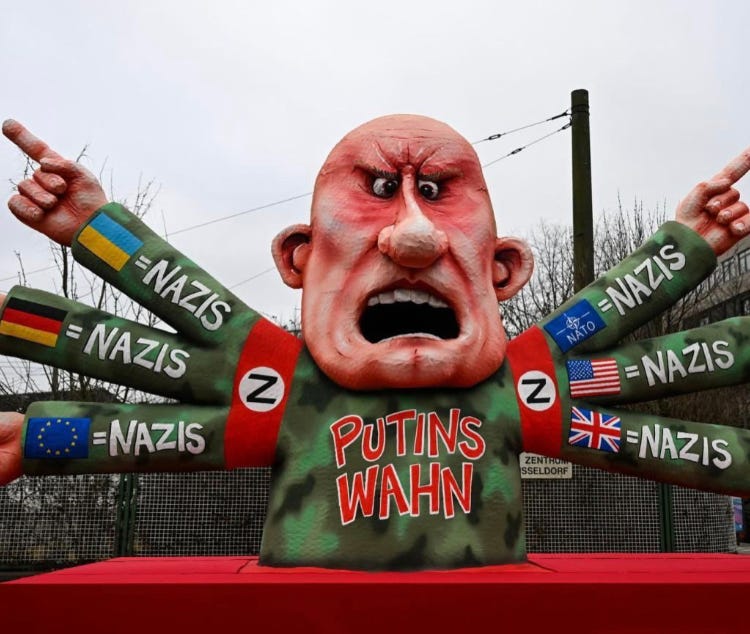
Of course Karneval is a time of great revelry and irreverance, so perhaps you see nothing a-miss in such exaggerative caricatures. Personally, I find these images chillingly reminiscent of the grotesque, racist, and dehumanising propaganda caricatures from previous wars depicting, for example, but not limited to German Krauts/Huns, Russian Bears/Hordes, Jewish Bankers/Globalists, English Dogs, Perfidious Albion, Japanese Japs/Nips, etc., etc.
Historically, the Irish have also been on the receiving end of such racist, unabashed bigotry at the hands of the British. Psychologists refer to this as “othering", effectively framing a group as fundamentally different, rendering it neither deserving of respect, sympathy, nor mercy. It facilitates hatred and overrides any natural empathic impulse toward our fellow humans who might happen to, have different skin pigmentation, speak a different language, or hold different cultural values.
War is Hell
Lest we forget. Chris Hedges a Pulitzer Prize-winning journalist who was a foreign correspondent for 15 years for The New York Times, where he served as the Middle East bureau chief and Balkan bureau chief for the paper has seen more suffering and destruction in warzones than most. Here he describes the evils of war:
“War destroys all systems that sustain and nurture life–familial, economic, cultural, political, environmental, and social. Once war begins, no one, even those nominally in charge of waging war, can guess what will happen, how the war will develop, how it can drive armies and nations towards suicidal folly. There are no good wars. None. This includes World War II, which has been sanitized and mythologized to mendaciously celebrate American heroism, purity, and goodness. If truth is the first casualty in war, ambiguity is the second. The bellicose rhetoric embraced and amplified by the American press, demonizing Vladimir Putin and elevating the Ukrainians to the status of demigods, demanding more robust military intervention along with the crippling sanctions meant to bring down Vladimir Putin’s government, is infantile and dangerous. The Russian media narrative is as simplistic as ours.”
I fully recommend his visceral piece from one year ago, March 2nd, 2022: War is the Greatest Evil9
How will this end?
This morning, two reports on Bavarian state public radio again caught my attention. The first reported that a German colonel, the head of the independent group, the German Armed Forces Association (a cross between a union and lobby group), in an interview with Das Bild tabloid warned it would be naïve to expect the war end within a year and that, “We are experiencing a decade of war in Europe. We must continue to support Ukraine and at the same time equip our armed forces faster.”10
The second report was on a peace protest in Berlin which attracted approximately 13,000 paticipants11 (so really not that big for Berlin, though it followed a protest in solidarity with Ukraine, attended by just 10,000 people in Berlin on Friday night) and was organised by Sarah Wagenknecht, the leader of Die Linke (a minority political party, The Left) and Alice Schwarzer, a prominent feminist, women’s rights activist and journalist. Both women had started a peace initiative earlier this month calling on the Bundeskanzler to end arms deliveries to Ukraine insisting on peace negotiations instead. Despite their petition receiving over a half a million signatures, Wagenknecht’s own party distanced itself from the protest, as did just about every other political party, with most calling their ideas naïve and accusing them of not adequately distancing themselves from the far right, ie. Kontaktschuld - “guilt by association". Pacifism is once again besmirched.
[UPDATE: 28.02.2023 The organisers have claimed attendance of 50,000. The true figure will most likely lie somewhere between that and the police estimates of 13,000.]
Summary
Fearing this will not end well is one of this Irishman’s driving motivations to document his thoughts and observations from this little corner of the former Kingdom of Alemannia and to share them with a wider audience.
Slán for now, or as the locals here like to say, Pfiat euch!
Please feel free to share if you think others would appreciate this post.
Thanks for reading An Irishman’s Diary in Times of War and Pestilence, please subscribe if you would like to receive new posts delivered direct to your e-mail inbox.




